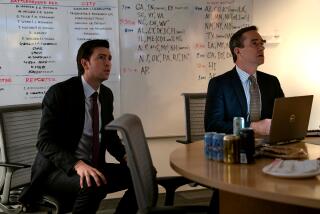Day of Decision for HP
- Share via
One of the most intensely fought proxy battles in years will come to an end Tuesday in a college auditorium in Cupertino, Calif., when the last Hewlett-Packard Co. shareholders will vote on HP’s planned $22-billion acquisition of Compaq Computer Corp.
As many as 2,000 investors are expected at the special meeting to witness the final fireworks between HP Chairwoman and Chief Executive Carly Fiorina and founder’s heir Walter Hewlett, the HP director who is leading the multimillion-dollar war of mailings, newspaper ads and telephone solicitations against the merger.
Over the last three months, 900,000 HP investors have been bombarded with arguments, expert endorsements and personal attacks from each side, and Tuesday will be their last day to decide between the vision of Fiorina and that of Hewlett.
But what they decide may not be known for weeks.
Fiorina, the first outsider picked to lead the storied but slow-moving Silicon Valley stalwart, will gavel the meeting and make her closing argument to the audience, stressing that Compaq will give HP a commanding position in many markets for technology hardware and the scale to compete with the likes of IBM Corp. in consulting and other services.
Traditionally at such meetings, the opposition is given a shorter time to make its case, but HP and Hewlett still were negotiating logistics over the weekend. “It’s their show,” said Hewlett spokesman Todd Glass.
Hewlett and more than a dozen of his allied lawyers, proxy solicitors and publicists will be there in any case. They say no technology merger even close to the size of HP and Compaq has ever worked and that Compaq is mired in the personal computer business, where it is unprofitable and losing market share to Dell Computer Corp.
The soap opera showdown pits a charismatic former marketing executive who vowed to quicken HP’s pace against Hewlett, a philanthropist, academic and software engineer who says his father would never have planned a business combination that called for the elimination of 15,000 jobs.
It also is a referendum on investor confidence in the computer industry, where more than a decade of steady growth in PCs gave way last year to a downturn.
The vote comes during an intensely nervous time in Silicon Valley--so nervous that San Jose’s Tech Museum of Innovation tonight will host Intel Corp. Chairman Andy Grove and computer-law guru Lawrence Lessig at a discussion entitled “Is the Information Revolution Dead?”
The less certain HP investors are about the future health of the PC industry, the more likely they are to vote Compaq down. (Compaq’s shareholders, set to vote Wednesday, are more likely to back the deal whatever their feelings on the industry.)
Hewlett’s foundations and those affiliated with the family of HP co-founder David Packard, which are not PC industry fans, have pledged to vote their combined 18% stake in HP against the deal.
By the weekend, Hewlett’s just-say-no campaign had attracted at least an additional 4% of HP shares held by institutions that have announced their position, including such pension funds as CalPERS. Fiorina has won the public backing of about 9% of the shares, including those voted by some of the company’s biggest investors.
With the majority unannounced, Tuesday’s outcome is up for grabs. HP, however, may have the edge in projecting confidence.
“We are feeling good. We are looking forward to Tuesday,” said company spokeswoman Rebeca Robboy. “We continue to receive strong indications of support,” including votes received by HP’s proxy solicitation firm from investors who haven’t commented publicly.
Neither side would say how many proxy cards they have taken in from supporters.
Many employees and retirees, and even some major mutual funds, are likely to vote in person Tuesday after hearing the debate.
But almost anything could happen from that point on: The results may well be too close to call because of two procedural wild cards.
The first variable is how many HP shares are voted out of the 1.94billion outstanding.
Since the winner will be determined by the majority of the shares that are voted, neither side needs to receive 51% of all possible proxies to feel confident of winning. Instead, they need to estimate the turnout, likely to be at least 85%, and make sure they have 51% of that figure. If it gets close, the actual turnout could be important, and that might not be known for some time.
The second variable is double or even triple voting. Each side has sent out multiple proxy cards, and shareholders can change their minds and send in replacement votes until Tuesday. Only the last vote counts.
So even though one side may have a majority, it needs to judge how much of a cushion it needs to cover any late vote switchers.
“Based on the institutional vote, either side may--may--be able to make a determination of a preliminary decision,” Robboy said.
But the bottom line is that any announcement of victory by either side that comes Tuesday, unless the vote is a blowout, is likely to be a judgment call that could prove wrong when official results come in several weeks from now.
The official, certified vote is still far off. The proxies voted at the meeting and those collected by the solicitation firms will be handed off Tuesday to IVS Associates Inc.. The firm will take the cards to its offices in Newark, Del., and begin counting privately, probably under guard, said IVS Principal Michael Barbera.
Even those results are subject to challenge, which could force a recount. And there’s always the chance of litigation.
“It’s possible it will end up like Florida,” Hewlett spokesman Glass said.






